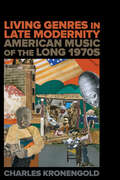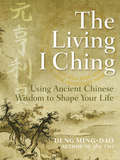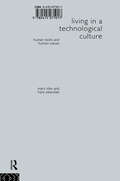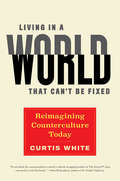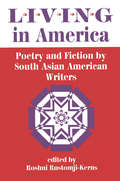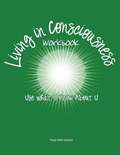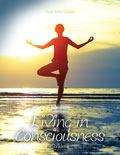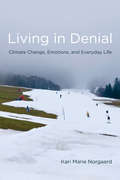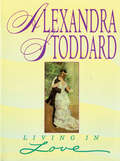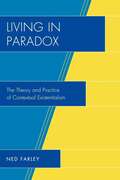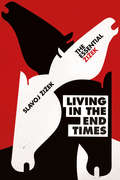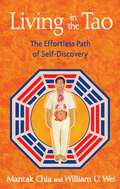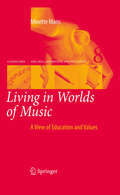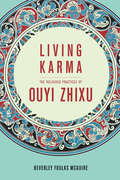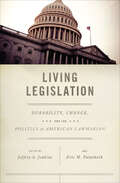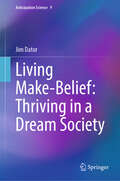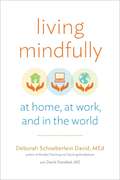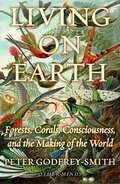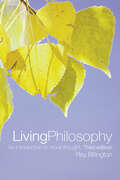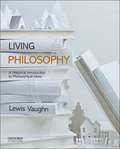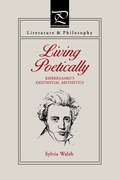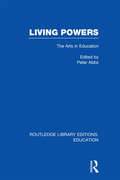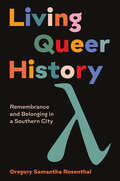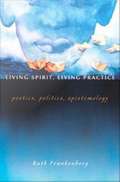- Table View
- List View
Living Genres in Late Modernity: American Music of the Long 1970s
by Charles KronengoldLiving Genres in Late Modernity rehears the American 1970s through the workings of its musical genres. Exploring stylistic developments from the late 1960s through the early 1980s, including soul, funk, disco, pop, the nocturne, and the concerto, Charles Kronengold treats genres as unstable constellations of works, people, practices, institutions, technologies, money, conventions, forms, ideas, and multisensory experiences. What these genres share is a significant cultural moment: they arrive just after "the sixties" and are haunted by a sense of belatedness, loss, or doubt, even as they embrace narratives of progress or abundance. These genres give us reasons—and means—to examine our culture’s self-understandings. Through close readings and large-scale mappings of cultural and stylistic patterns, the book’s five linked studies reveal how genres help construct personal and cultural identities that are both partial and overlapping, that exist in tension with one another, and that we experience in ebbs and flows.
The Living I Ching
by Deng Ming-DaoFrom the author of 365 Tao and a leading authority on Taoist practice and philosophy comes a completely innovative translation of the classic text of Eastern wisdom, the I Ching. The I Ching, or Book of Changes, is an ancient manual for divining the future. Its basic text is traditionally attributed to the Chinese King Wen, the Duke of Zhou, and the philosopher Confucius. By tossing coins, rolling dice, using a computer, or, more traditionally, counting yarrow stalks, one can create a seemingly random combination of heads or tails, odd or even, yin or yang, to construct six lines (for example, solid for odd numbers or broken for even numbers). These six lines make up a hexagram that provides advice, predictions, and answers to questions on topics from love and career to family and finance. While known mostly as a tool of divination, the I Ching is also a repository of centuries of wisdom. Most of the existing translations offer either dense, scholarly commentary or little more than fortune-cookie platitudes, but in The Living I Ching Deng Ming-Dao takes a more holistic approach. His new translation recovers the true wisdom and philosophy of this ancient classic, so that the I Ching becomes more than just a book of fortune-telling -- it becomes a manual for living.
Living in a Technological Culture: Human Tools and Human Values (Philosophical Issues in Science)
by Hans Oberdiek Mary TilesTechnology is no longer confined to the laboratory but has become an established part of our daily lives. Its sophistication offers us power beyond our human capacity which can either dazzle or threaten; it depends who is in control. Living in a Technological Culture challenges traditionally held assumptions about the relationship between `man-and-machine'. It argues that contemporary science does not shape technology but is shaped by it. Neither discipline exists in a moral vacuum, both are determined by politics rather than scientific inquiry. By questioning our existing uses of technology, this book opens up wider debate on the shape of things to come and whether we should be trying to change them now. As an introduction to the philosophy of technology this will be valuable to students, but will be equally engaging for the general reader.
Living in a World that Can't Be Fixed: Reimagining Counterculture Today
by Curtis White&“This is a book about counterculture, and that&’s a problem . . . &“ So begins Curtis White&’s thrilling call for the revitalization of counterculture today. The problem, White argues, is twofold: first, most of us think of counterculture as a phenomenon stuck in the 1960s, and, second, what passes as counterculture today . . . simply isn&’t. Nevertheless, a reimagined counterculture is our best hope to save the planet, bypass social antagonisms, and create the world we actually want to live in. Now. White—&“the most inspiringly wicked social critic of the moment" (Will Blythe, Elle)—shows how the products of our so-called resistance, from Ken Burns to Black Panther, rarely offer a meaningful challenge to power, and how our loyalty to the &“American Lifestyle&” is self-defeating and keeps us from making any real social change. The result is an inspiring case for practicing civil disobedience as a way of life, and a clear vision for a better world—full of play, caring, and human connection.
Living In America: Poetry And Fiction By South Asian American Writers
by Roshni Rustomji-KernsPerceptions and realities of life in North America are interwoven with memories of South Asia in this anthology of literary works focusing on South Asian American perspectives on the United States and Canada. Most of the short stories and poems deal explicitly with South Asian American experiences.
Living In Consciousness: Use What U Know About U
by Paula Heller GarlandLiving in Consciousnesses is a workbook based on self examination to achieve an elaborate, happy, healthy and fulfilled life. Covering self-knowledge, your believes, your perception, how you relate to and with others, Living in Consciousness aims at developing healthier and effective relationships.
Living in Consciousness Workbook
by Paula Heller-GarlandIn order to change it is important to know who you are, what you believe, and how you became that person. Only then can we live more comfortably in the present and cease unconscious reactions that result in undesired outcomes. <p><p> Living in Consciousness provides communication tips, techniques and examples, but on a deeper level, it will assist you in discovering the obstacles to your connection with others. It will provide a groundwork to understanding yourself in order to better understand others. <p> The workbook and program takes a look at who you are - from the inside out, how you became that person and assists you to map necessary changes. It is thought provoking, insightful and transformational. There is no limit to the benefits from taking on the challenges of this self-discovery.
Living in Denial: Climate Change, Emotions, and Everyday Life
by Kari Marie NorgaardAn analysis of why people with knowledge about climate change often fail to translate that knowledge into action.Global warming is the most significant environmental issue of our time, yet public response in Western nations has been meager. Why have so few taken any action? In Living in Denial, sociologist Kari Norgaard searches for answers to this question, drawing on interviews and ethnographic data from her study of "Bygdaby," the fictional name of an actual rural community in western Norway, during the unusually warm winter of 2000-2001.In 2000-2001 the first snowfall came to Bygdaby two months later than usual; ice fishing was impossible; and the ski industry had to invest substantially in artificial snow-making. Stories in local and national newspapers linked the warm winter explicitly to global warming. Yet residents did not write letters to the editor, pressure politicians, or cut down on use of fossil fuels. Norgaard attributes this lack of response to the phenomenon of socially organized denial, by which information about climate science is known in the abstract but disconnected from political, social, and private life, and sees this as emblematic of how citizens of industrialized countries are responding to global warming.Norgaard finds that for the highly educated and politically savvy residents of Bygdaby, global warming was both common knowledge and unimaginable. Norgaard traces this denial through multiple levels, from emotions to cultural norms to political economy. Her report from Bygdaby, supplemented by comparisons throughout the book to the United States, tells a larger story behind our paralysis in the face of today's alarming predictions from climate scientists.
Living in Love
by Alexandra StoddardWith the warmth and affection that has made her America's favorite lifestyle philosopher, bestselling author Alexander Stoddard shows readers how to find love within themselves, bring love into their lives, and enjoy living a lifetime in love.
Living in Paradox: The Theory and Practice of Contextual Existentialism
by Ned FarleyThis book focuses on the emergence of contextual existential theory and practice from more traditional existential psychology. Farley addresses the diversity of humankind and the need to be culturally aware as we attempt to address the dilemmas that present themselves to us in our daily lives.
Living in the End Times
by Slavoj ZizekThe underlying premise of the book is a simple one: the global capitalist system is approaching an apocalyptic zero-point. Its four riders of the apocalypse are the ecological crisis, the consequences of the biogenetic revolution, the imbalances within the system itself (problems with intellectual property, the forthcoming struggle for raw materials, food and water), and the explosions of social divisions and exclusions. Society's first reaction is ideological denial, then explosions of anger at the injustices of the new world order, attempts at bargaining, and when this fails, depression and withdrawal set in. Finally, after passing through this zero-point we no longer perceive it as a threat, but as the chance for a new beginning. or, as Mao Zedong might have put it, "There is great disorder under heaven, the situation is excellent." i ek traces out in detail these five stances, makes a plea for a return to the Marxian critique of political economy, and sniffs out the first signs of a budding communist culture in all its diverse forms--in utopias that range from Kafka's community of mice to the collective of freak outcasts in the TV series Heroes.
Living in the Tao: The Effortless Path of Self-Discovery
by Mantak Chia William U. WeiTaoist techniques that can quiet your mind so you can discover your true self in the wisdom of the heart • Teaches that the Tao is the flow of nature, the effortless middle path of self-discovery • Shows how to quiet the monkey mind (the ego) and listen within for your inner voice • Fosters a connection to the Tao through diet, exercise, livelihood, and sexuality Taoists say that we must learn to observe with the mind and think with the heart. In the West we get caught up in the “monkey mind” of our ego. We think we can control our individual destinies by swimming upstream against the current, but we are mistaken. When we learn to quiet the monkey mind with meditation practices, we are able to go beyond the linear thinking of the upper brain and connect to the multidimensional thinking of supreme consciousness in the heart center. In Living in the Tao, Master Mantak Chia and William Wei present techniques to help us learn to move beyond the limits of time and space to connect with the universal truth within--without striving. Living in the Tao is effortless. Just as a small seed grows into a mighty tree with a little water and a little sunshine every day, a few minutes of Taoist practice each day can transform your life into one of peace and joy.
Living in Worlds of Music
by Minette MansInformed by her in-depth ethnomusical knowledge, the result of detailed fieldwork, Mans's book is about musical worlds and how we as people inhabit them. The book asserts that an understanding of our musical worlds can be a transformative educational tool that could have a significant role to play in multicultural music and arts education. She explores the way in which musical expression, with its myriad cultural variations, reveals much about identity and cultural norms, and shows how particular musical sounds are aesthetically related to these norms. The author goes further to suggest that similar systems can be detected across cultures, while each world remains colored by a distinctive soundscape. Mans also looks at the way each cultural soundscape is a symbolic manifestation of a society's collective cognition, sorting musical behavior and sounds into clusters and patterns that fulfill each society's requirements. She probes the fact that in today's globalized and mobile world, as people move from one society to another, cross-cultural acts and hybrids result in a number of new aesthetics. Finally, in addition to three personal narratives by musicians from different continents, the author has invited scholars from diverse specializations and locations to comment on different sections of the book, opening up a critical dialogue with voices from different parts of the globe. Musical categorization, identity, values, aesthetic evaluation, creativity, curriculum, assessment and teacher education are some of the issues tackled in this manner.
Living Karma: The Religious Practices of Ouyi Zhixu (The Sheng Yen Series in Chinese Buddhist Studies)
by Beverley McGuireOuyi Zhixu (1599–1655) was an eminent Chinese Buddhist monk who, contrary to his contemporaries, believed karma could be changed. Through vows, divination, repentance rituals, and ascetic acts such as burning and blood writing, he sought to alter what others understood as inevitable and inescapable. Drawing attention to Ouyi's unique reshaping of religious practice, Living Karma reasserts the significance of an overlooked individual in the modern development of Chinese Buddhism.While Buddhist studies scholarship tends to privilege textual analysis, Living Karma promotes a balanced study of ritual practice and writing, treating Ouyi's texts as ritual objects and his reading and writing as religious acts. Each chapter addresses a specific religious practice—writing, divination, repentance, vows, and bodily rituals—offering first a diachronic overview of each practice within the history of Chinese Buddhism and then a synchronic analysis of each phenomenon through close readings of Ouyi's work. This book sheds much-needed light on a little-known figure and his representation of karma, which proved to be a seminal innovation in the religious thought of late imperial China.
Living Legislation: Durability, Change, and the Politics of American Lawmaking
by William J. Novak Jeffrey E. Cohen Matthew Eshbaugh-Soha Sean Gailmard Christopher R. Berry Barry C. Burden William G. Howell Forrest Maltzman Charles R. Shipan Amihai Glazer David E. Lewis Stuart Chinn Vesla M. Weaver David R. Mayhew Sidney M. MilkisPolitical scholars examine the dynamic evolution of laws over time in a volume that &“pushes the frontiers of knowledge about lawmaking in the US&” (Choice). Politics is at its most dramatic during debates over important pieces of legislation. And while debates over legislative measures can rage for years or even decades before an item is enacted, they also endure long afterward, when the political legacy of a law eventually comes into focus. With a diverse set of contributors—including quantitative political scientists, political development scholars, historians, and economists—Living Legislation provides fresh insights into contemporary American politics and public policy. Many of the contributors to this volume focus on the question of why some laws stand the test of time while others are eliminated, replaced, or significantly amended. Others discuss how laws emerge from—and effect change within—coalition structures; the effectiveness of laws at mediating partisan conflicts; and the ways in which laws interact with broader shifts in the political environment. An essential addition to the study of politics, Living Legislation enhances understanding of democracy, governance, and power.
Living Make-Belief: Thriving in a Dream Society (Anticipation Science #9)
by Jim DatorThis book shows how multiple developments have caused the world to move from “an information society” to a “dream society”. Ongoing social and technological forces are pushing us from a world of words, rationality, and truth into a world of images, performance, and make-belief. Rather than deny or reject this transformation, this book argues that one should understand and embrace it as waves of new futures that the world must strive to surf for fame and fun. As a political scientist and futurist, the author also offers hints of new goals and forms of governance fit for a dream society, as he demonstrates that all current systems are ineffective and dangerously obsolete. This book is of great interest to political philosophers, futures scientists, sociologists, and those interested in cultural studies.
Living Mindfully
by Deborah Schoeberlein David David PanakkalLearn to live a life that's good--for yourself and for the world.Like a wise friend or kind teacher, Deborah Schoeberlein David--educator, meditator, and mother--walks you through a complete, easy-to-follow curriculum of mindfulness practice. Beginning with the very basics of noticing your breath, David shows how simple mindfulness practices can be utterly transforming. Each practice builds on the previous exercise like a stepping stone, until you have the tools to bring mindfulness into every aspect of your life including sex, parenting, relationships, job stresses, and more. This is an approachable guide for anyone who desires positive change.
Living on Earth: Forests, Corals, Consciousness, and the Making of the World
by Peter Godfrey-SmithThe bestselling author of Other Minds shows how we and our ancestors have reinvented our planet.If the history of the Earth were compressed down to a year, our species would arise in the last thirty minutes or so of the final hour. But life itself is not such a late arrival: It has existed on Earth for something like 3.7 billion years—most of our planet’s history and over a quarter of the age of the universe (as far as we can tell). What have these organisms—bacteria, animals, plants, and the rest—done in all this time? In Living on Earth, the philosopher Peter Godfrey-Smith proposes a new way of understanding how the actions of living beings have shaped our planet. Where his acclaimed books Other Minds and Metazoa explored the riddle of how conscious minds came to exist on Earth, Living on Earth turns to what happens when we look at the mind from another side—when we come to see organisms as active causes, not merely as results of the evolutionary process. The planet we inhabit is significantly the work of other living beings, who shaped the environments that we ourselves later transformed. To that end, Godfrey-Smith takes us on a grand tour of the history of life on earth. He visits Rwandan gorillas and Australian bowerbirds, returns to coral reefs and octopus dens, considers the impact of language and writing, and weighs the responsibilities our unique powers bring with them, as they relate to factory farming, habitat preservation, climate change, and the use of animals in experiments. Ranging from the seas to the forests, and from animate matter’s first appearance to its future extinction, Godfrey-Smith offers a novel picture of the course of life on Earth and how we might meet the challenges of our time, the Anthropocene.
Living Philosophy: An Introduction to Moral Thought
by Ray BillingtonFirst published in 2003. Routledge is an imprint of Taylor & Francis, an informa company.
Living Philosophy: A Historical Introduction to Philosophical Ideas
by Lewis VaughnThis second edition of Living Philosophy guides students in a survey of the historical march of philosophical ideas, encouraging an appreciation of the significance of these ideas in Western and Eastern thought. Living Philosophy provides this guidance in five fundamental ways: it tells a coherent story of philosophical thought from the pre-Socratics to the present; it provides the cultural and intellectual background for this story; it explains why the major issues and arguments are important and relevant today; it includes substantial, well-chosen excerpts from the philosophers' works; and it presents all these elements in a way that engages and stimulates student interest and understanding. Living Philosophy includes solid coverage of critical-thinking skills and argument basics as well as practice in reading philosophical works. Students learn how to do philosophy--to think and write philosophically--when they get encouragement and practice in analyzing and critiquing their own views as well as those philosophers they study. To this end, Living Philosophy emphasizes philosophical writing, reinforced with step-by-step coaching in how to write argumentative essays on philosophical topics and supported by multiple opportunities to hone basic skills. Living Philosophy further engages today's learners with abundant illustrations and graphics; marginal glosses, questions, and quotations; profiles of a diverse array of philosophers; and ample representation of non-Western and nontraditional sources and voices.
Living Poetically: Kierkegaard's Existential Aesthetics (Literature and Philosophy)
by Sylvia WalshLiving Poetically is the first book to focus primarily on Kierkegaard's existential aesthetics as opposed to traditional aesthetic features of his writings such as the use of pseudonyms, literary techniques and figures, and literary criticism. Living Poetically traces the development of the concept of the poetic in Kierkegaard's writings as that concept is worked out in an ethical-religious perspective in contrast to the aesthetics of early German romanticism and Hegelian idealism. Sylvia Walsh seeks to elucidate what it means, in Kierkegaard's view, to be an authentic poet in the form of a poetic writer and to clarify his own role as a Christian poet and writer as he understood it. Walsh shows that, in spite of strong criticisms made of the poetic in some of his writings, Kierkegaard maintained a fundamentally positive understanding of the poetic as an essential ingredient in ethical and religious forms of life. Walsh thus reclaims Kierkegaard as a poetic thinker and writer from those who would interpret him as an ironic practitioner of an aestheticism devoid of and detached from the ethical-religious as well as from those who view him as rejecting the poetic and aesthetic on ethical or religious grounds.Viewing contemporary postmodern feminism and deconstruction as advocating a romantic mode of living poetically, Walsh concludes with a feminist reading of Kierkegaard that affirms both individuality and relatedness, commonalities and differences between the self and others, men and women, for the fashioning of an authentic mode of living poetically in the present age.
Living Powers: The Arts in Education (Routledge Library Editions: Education)
by Peter AbbsWhen originally published this was the first book to offer a collective history of all the arts – Art, Drama, Dance, Music, Literature and Film – in the curriculum. It also offers a coherent framework for the teaching of arts which is in line with the best current trends since the Gulbenkian Report of 1982. It insists that the arts, seen together should be an essential part of the national curriculum.
Living Queer History: Remembrance and Belonging in a Southern City
by Gregory Samantha RosenthalQueer history is a living practice. Talk to any group of LGBTQ people today, and they will not agree on what story should be told. Many people desire to celebrate the past by erecting plaques and painting rainbow crosswalks, but queer and trans people in the twenty-first century need more than just symbols—they need access to power, justice for marginalized people, spaces of belonging. Approaching the past through a lens of queer and trans survival and world-building transforms history itself into a tool for imagining and realizing a better future. Living Queer History tells the story of an LGBTQ community in Roanoke, Virginia, a small city on the edge of Appalachia. Interweaving &8239;historical analysis, theory, and memoir, Gregory Samantha Rosenthal tells the story of their own journey—coming out and transitioning as a transgender woman—in the midst of working on a community-based history project that documented a multigenerational southern LGBTQ community. Based on over forty interviews with LGBTQ elders, Living Queer History explores how queer people today think about the past and how history lives on in the present.
Living Spirit, Living Practice: Poetics, Politics, Epistemology
by Ruth FrankenbergIn Living Spirit, Living Practice, the well-known cultural studies scholar Ruth Frankenberg turns her attention to the remarkably diverse nature of religious practice within the United States today. Frankenberg provides a nuanced consideration of the making and living of religious lives as well as the mystery and poetry of spiritual practice. She undertakes a subtle sociocultural analysis of compelling in-depth interviews with fifty women and men, diverse in race, ethnicity, national origin, class, age, and sexuality. Tracing the complex interweaving of sacred and secular languages in the way interviewees make sense of the everyday and the extraordinary, Frankenberg explores modes of communication with the Divine, the role of the body, the importance of geography, work for progressive social change, and the relation of sex to spirituality. Christians, Jews, Muslims, Buddhists, Hindus, and other practitioners come together here, speaking in terms both familiar and surprising. Whether discussing an Episcopalian deacon, a former Zen Buddhist who is now a rabbi, a Chicano monastic, an immigrant Muslim woman, a Japanese American Tibetan Buddhist, or a gay African American practicing in the Hindu tradition, Frankenberg illuminates the most intimate, local, and singular aspects of individual lives while situating them within the broad, dynamic canvas of the U. S. religious landscape.
Living the Qur'an in Our Times
by Jamal KhwajaIn a world where powerful lobbies are vilifying the Qur'an as the underlying cause of conflicts-conflicts that are actually rooted in greed and the self-serving secular politics of oil, occupation and social injustice-how can non-Muslims discover the authentic teachings of the Qur'an? How can they work with Muslims to overcome mutual suspicions, stereotyping, and self-serving propaganda? A starting point is would be to recognize that Muslims worldwide are engaged in diverse and robust internal debates. While it is an integral part of the Islamic faith that the Qur'an is the infallible "Word of God," the plain fact is that there is significant disagreement among the faithful over what the revealed texts mean or imply on a host of issues. In Living the Qur'an in Our Times, the author combines theological insight and philosophical erudition to delve into the semantics of the Qur'an and its vision. This work explains why traditional religion has failed to respond adequately to challenges posed by modernity. It strives to recognize the intimate connection between a Muslim's struggle to live the Qur'an authentically and the many ethical and moral dilemmas one faces daily in one's life. Enlightening for all those who are unfamiliar with Islamic history and the Qur'an, this book explores foundational Islamic principles that emphasize mutual respect and cooperation among all people, thus helping cultivate a vibrant Islamic identity in today's interdependent, multicultural global environment.
